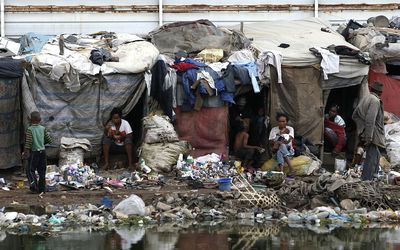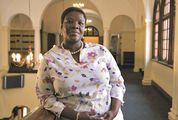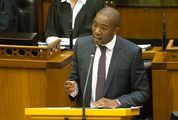Mauritius and Madagascar: two islands worlds apart
by Lyal White and Adrian Kitimbo,
2016-02-29 06:09:52.0
MADAGASCAR and Mauritius are both in the Indian Ocean off the coast of Africa. Both were once French colonies, with language, culture and Francophone systems and institutions.
In Mauritius, the British usurped French rule in 1810, but retained French culture and law. Both islands won independence in the same decade — Madagascar in 1960 and Mauritius eight years later, in 1968.
Yet, the political and economic trajectories of the two countries since independence could not be more different. The contrast is perhaps most stark in their socioeconomic development in the past 40 years.
Today, Mauritius is the most competitive economy in Africa, while Madagascar is facing some of the most daunting development challenges in the region on the back of decades of instability.
Some liken Mauritius to Singapore. With a small population of 1.3-million and the progress it has made in growing from a sugar-based agrarian economy to a financial services hub, Mauritius exhibit traits of an Asian Tiger.
Development economists have studied it as an outlier in the African context. Nobel prize winner Joseph Stiglitz refers to the "Mauritius miracle".
At $10,000, the country boasts a per capita income 10 times the regional average.
But Mauritius is no miracle. Instead, it is an example of concerted choices and decisions to grow and develop through careful planning. Key to this has been a healthy and educated workforce.
With a strong focus on education and healthcare since the 1970s, Mauritius has invested heavily in the social welfare of its citizens and provides free universal education and healthcare.
It now ranks 63 out of 188 countries on the UN Human Development Index, unmatched by any other country in Africa.
Mauritius diversified its economy from a sugar-based monoculture to manufacturing and tourism and, more recently, world-class financial services.
Sustained economic growth, in the same mould of the Asian Tigers, has been crucial. Mauritius’s economy grew at 5% for three consecutive decades until 2009. This provided a foundation for economic advancement, industrialisation and, ultimately, a service-based economy, meeting the essentials of broad-based development.
Meanwhile, Madagascar has — as described by a development bank expert — experienced 50 years of decline. The country slipped into economic and political freefall following a coup d’état in 2009, just as the rest of Africa was capturing the world’s attention with its so-called rising narrative.
While the rest of the continent was enjoying its best growth decade on record, Madagascar’s economic growth was well below its population growth, entrenching serious development implications.
Despite a rich endowment of metals and minerals — it boasts one of the world’s largest nickel mines and the largest reserves of sapphires — Madagascar remains one of the least developed countries in the world. Its per capita income stands at a dismal $440 per annum.
But, with yawning inequality, the reality for ordinary Malagasies is even worse. Close to 90% of its 23-million citizens live on less than $2 a day. Health and education are at some of the lowest levels in the world, resulting in one of the poorest performances on the Human Development Index, ranking 154 out of 188.
In terms of aid, where development assistance is determined by performance and provided through incentives, Madagascar receives less than a seventh of the US dollar value development assistance countries such as Mozambique receive from organisations such as the World Bank. This is based on Madagascar’s declining performance.
Experts seem to agree that years of poor politics and mis-governance have made Madagascar the worst-performing country that has not been in a state of war or armed conflict in the past few decades.
The implications for business are obvious. Single-factor theorems that suggest a comparative advantage by virtue of natural resources or population size and demographics explain precious little of the internal dynamics that shape and drive economic progress. Not to mention a gross distortion of market potential and inflated expectations around a so-called growing middle class.
Much depends on political decisions, policy choices and the institutions designed to manage them. For example, according to the GIBS Dynamic Market Index 2016, Mauritius is also a much more open and connected market and scores higher than Madagascar on key indicators such as the justice system, red tape and other areas of institutional progress.
The World Bank’s Ease of Doing Business Index ranks Mauritius at 28 out of 189 countries. Madagascar ranked 163. These measures have proven crucial in attracting investment and driving growth.
Mauritius is a much smaller island with fewer resources and a population a fraction of the size of nearby Madagascar. But, as this story of two islands shows, countries advance as a result of the choices that are made and a real commitment to inclusive growth. This may start with a plan, but requires a long-term commitment to improving the health and education of its people.
• White is the director of the Centre for Dynamic Markets at GIBS. Kitimbo is a senior researcher for the centre

Unlike its Indian Ocean neighbour Mauritius, Madagascar has failed to create an environment that encourages growth and development. Picture: REUTERS/THOMAS MUKOYA
MADAGASCAR and Mauritius are both in the Indian Ocean off the coast of Africa. Both were once French colonies, with language, culture and Francophone systems and institutions.
In Mauritius, the British usurped French rule in 1810, but retained French culture and law. Both islands won independence in the same decade — Madagascar in 1960 and Mauritius eight years later, in 1968.
Yet, the political and economic trajectories of the two countries since independence could not be more different. The contrast is perhaps most stark in their socioeconomic development in the past 40 years.
Today, Mauritius is the most competitive economy in Africa, while Madagascar is facing some of the most daunting development challenges in the region on the back of decades of instability.
Some liken Mauritius to Singapore. With a small population of 1.3-million and the progress it has made in growing from a sugar-based agrarian economy to a financial services hub, Mauritius exhibit traits of an Asian Tiger.
Development economists have studied it as an outlier in the African context. Nobel prize winner Joseph Stiglitz refers to the "Mauritius miracle".
At $10,000, the country boasts a per capita income 10 times the regional average.
But Mauritius is no miracle. Instead, it is an example of concerted choices and decisions to grow and develop through careful planning. Key to this has been a healthy and educated workforce.
With a strong focus on education and healthcare since the 1970s, Mauritius has invested heavily in the social welfare of its citizens and provides free universal education and healthcare.
It now ranks 63 out of 188 countries on the UN Human Development Index, unmatched by any other country in Africa.
Mauritius diversified its economy from a sugar-based monoculture to manufacturing and tourism and, more recently, world-class financial services.
Sustained economic growth, in the same mould of the Asian Tigers, has been crucial. Mauritius’s economy grew at 5% for three consecutive decades until 2009. This provided a foundation for economic advancement, industrialisation and, ultimately, a service-based economy, meeting the essentials of broad-based development.
Meanwhile, Madagascar has — as described by a development bank expert — experienced 50 years of decline. The country slipped into economic and political freefall following a coup d’état in 2009, just as the rest of Africa was capturing the world’s attention with its so-called rising narrative.
While the rest of the continent was enjoying its best growth decade on record, Madagascar’s economic growth was well below its population growth, entrenching serious development implications.
Despite a rich endowment of metals and minerals — it boasts one of the world’s largest nickel mines and the largest reserves of sapphires — Madagascar remains one of the least developed countries in the world. Its per capita income stands at a dismal $440 per annum.
But, with yawning inequality, the reality for ordinary Malagasies is even worse. Close to 90% of its 23-million citizens live on less than $2 a day. Health and education are at some of the lowest levels in the world, resulting in one of the poorest performances on the Human Development Index, ranking 154 out of 188.
In terms of aid, where development assistance is determined by performance and provided through incentives, Madagascar receives less than a seventh of the US dollar value development assistance countries such as Mozambique receive from organisations such as the World Bank. This is based on Madagascar’s declining performance.
Experts seem to agree that years of poor politics and mis-governance have made Madagascar the worst-performing country that has not been in a state of war or armed conflict in the past few decades.
The implications for business are obvious. Single-factor theorems that suggest a comparative advantage by virtue of natural resources or population size and demographics explain precious little of the internal dynamics that shape and drive economic progress. Not to mention a gross distortion of market potential and inflated expectations around a so-called growing middle class.
Much depends on political decisions, policy choices and the institutions designed to manage them. For example, according to the GIBS Dynamic Market Index 2016, Mauritius is also a much more open and connected market and scores higher than Madagascar on key indicators such as the justice system, red tape and other areas of institutional progress.
The World Bank’s Ease of Doing Business Index ranks Mauritius at 28 out of 189 countries. Madagascar ranked 163. These measures have proven crucial in attracting investment and driving growth.
Mauritius is a much smaller island with fewer resources and a population a fraction of the size of nearby Madagascar. But, as this story of two islands shows, countries advance as a result of the choices that are made and a real commitment to inclusive growth. This may start with a plan, but requires a long-term commitment to improving the health and education of its people.
• White is the director of the Centre for Dynamic Markets at GIBS. Kitimbo is a senior researcher for the centre
























Data supplied by Profile Data
Change: -0.56%
Change: 0.43%
Change: 0.73%
Change: 0.00%
Change: 0.56%
Data supplied by Profile Data
Change: -0.79%
Change: -0.03%
Change: 0.34%
Change: 0.58%
Change: 0.36%
Data supplied by Profile Data
Change: 0.67%
Change: 1.02%
Change: 0.83%
Change: 1.03%
Change: 1.79%
Data supplied by Profile Data